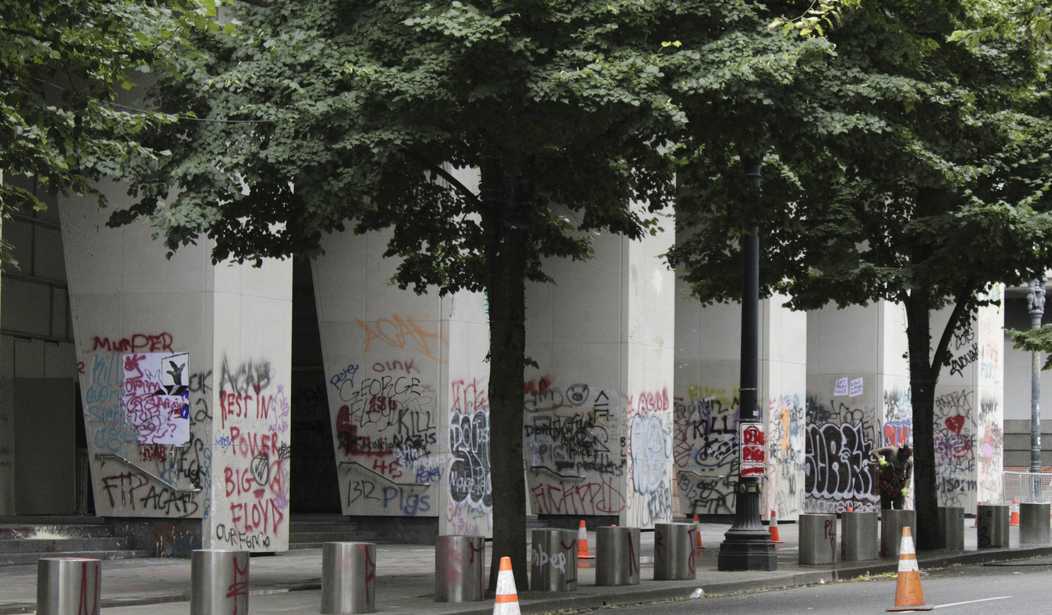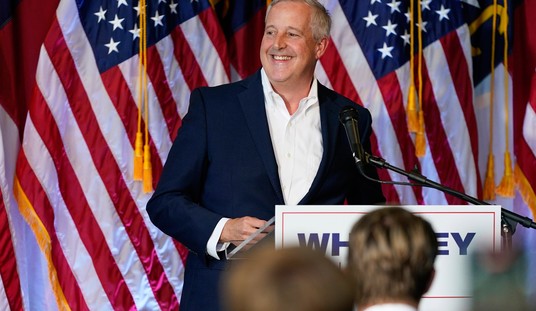A U.S. District Court judge on Tuesday temporarily blocked police in Seattle, Washington, from making graffiti-related arrests, despite the city’s ordinance against vandalizing property, which includes graffiti. Even worse, the liberal judge’s reason — excuse — for doing so was laughably absurd on its face.
The Seattle Times reported that U.S. District Court Judge Marsha Pechman’s order prohibits arrests under the aforementioned law, which four plaintiffs claim violated their First and 14th Amendment rights, among other claims, “by being both vague and overbroad.”
Translation: Arresting vandals for damaging public or private property by painting their political (or other) views on said properties violates the vandals’ freedom of speech — and in particular, the free-speech rights of “women and other marginalized genders.”
You see where this is headed, right?
Anyway, let’s back up the bus before continuing forward. Seattle Mayor Bruce Harrell, in October 2022, detailed the elements of his One Seattle Graffiti Plan to beautify Seattle and address a surge in graffiti, through new strategies and proposed budget investments.
We have an opportunity to envision a more beautiful Seattle – with murals and canvasses that reflect our values of creativity, inclusion, and forward-thinking. Not only does tagging and graffiti detract from the vibrancy of our city, there are tangible impacts on communities targeted by hate speech, small business owners whose shops are defaced, and residents who rely on City signage for information and guidance. Incidents of graffiti have dramatically increased throughout the pandemic, and progress requires a One Seattle approach, where we work together to advance proven solutions, reduce silos, and tap into our greatest resource – our community.
At the time of the mayor’s 2022 announcement, graffiti reported by the Seattle public since 2019 had grown by more than 50 percent, including nearly 20,000 reports of graffiti and tagging in 2021. (Tagging refers explicitly to writing one signature — or their pseudonym name or logo — on a public surface.)
Here’s more on the plaintiff’s claims that led to the judge’s decision, via the Seattle Times:
The case dates back to January 2021 when the plaintiffs — Derek Tucson, Robin Snyder, Monsieree de Castro, and Erik Moya-Delgado — protested Seattle police by writing statements like “[Expletive] the Police” in charcoal and chalk on a temporary concrete wall outside of Seattle’s East Precinct. According to Braden Pence, an attorney representing the plaintiffs, the first person was arrested after writing “peaceful protest” on the wall with a piece of coal.
The law “is written in a way that maybe, if the police were reasonable and could be trusted to exercise their discretion in a just way, it wouldn’t have ever become a problem,” Pence said. “But the fact is they can’t be trusted.”
[…]
Pechman wrote Tuesday that the city’s current statute could be used for censorship, noting that “there is allegedly a policy not to arrest children drawing rainbows on the sidewalk,” but the statute would allow for that or the arrest of “those who might scribe something that irks an individual officer.”
The injunction caused turbulence among the city’s criminal law staff on Wednesday, as it enjoined the whole of the city’s property destruction code, not just the section related to graffiti.
Only in the minds of the rabid left could charcoaling or painting “F*** the Police,” on private or public property be considered “free speech.”
In reaction to Judge Pechman’s at least temporarily blocking the city’s ban on graffiti, the Seattle Police Department said in a news release:
This means that until further order of the Court, SPD cannot take action on damage to property under this law. This is not a matter within SPD or City discretion; we are bound by the court order as it is written.
So, there it is.
The Bottom Line
Even when a liberal mayor of a liberal city attempts to stop the further destruction of his city, left-wing insanity rises to the occasion, convincing a left-wing judge to suggest, if only temporarily, that writing “F*** the Police,” or other such “hate speech,” on someone else’s property “might” be a right — protected by the First Amendment to the Constitution of the United States of America, no less.
What a slippery slope on which we find ourselves.














Join the conversation as a VIP Member